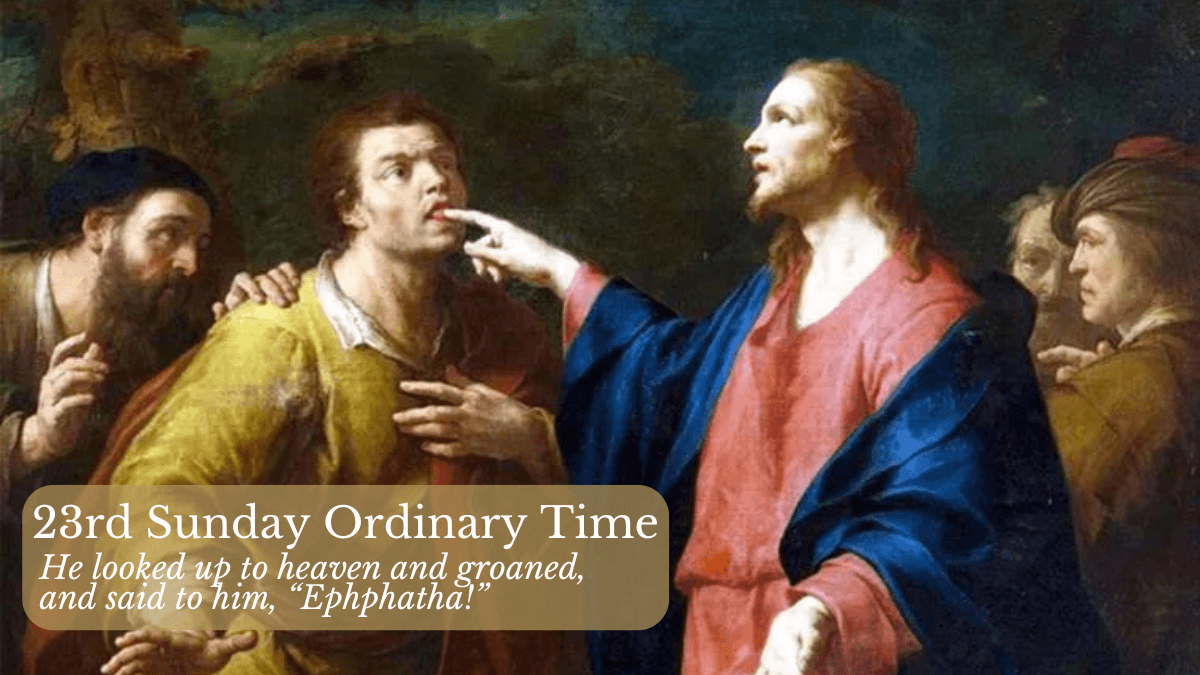On the Back Porch
Reading, pondering and studying God’s Word is sometimes best done “on the back porch.” Each week we will try to offer something for you and your “back porch time.”

23rd Sunday, Year B

What We Celebrate
Jesus in on the move. In this part of the Gospel of Mark Jesus and the disciples move from Galilee into the region of the Decapolis, a foray into Gentile territory. It is a section of the gospel “bookended” by two accounts of the miraculous multiplication of bread – but between the ends, Jesus encounters the Syro-Phoenician woman and the man with deafness and speech impediment – both potentially “unclean” in the eyes of the Pharisee and scribes. As Jesus challenged their understanding of the “tradition of the elders” previously, he does so again with his healing actions.
The story of the deaf-mute is like a gate swinging back and forth. It swings back to the story of the Syro-Phoenician woman, because the deaf-mute also comes from a non-Jewish part of Palestine (v. 31). It swings forward to the next chapter, to the story of the blind man (8:22–26), which closely parallels this cure. Both the deaf-mute and the blind man are brought to Jesus by others (v. 32; 8:22). Both times Jesus takes the men away from the crowd (v. 33; 8:23) and touches them, using spittle to heal them (vv. 33–35 and 8:23, 25).
These obvious parallels make it clear that Mark wants the two cures to be read side by side. In this way, Mark’s readers will hardly be able to miss that Jesus is the Messiah promised by Isaiah long before when he said: “Then will the eyes of the blind be opened, the ears of the deaf be cleared” (Isa 35:5–6)
As always, a lot going on in the gospel reading. Grab a cup of your favorite beverage and take a moment on the back porch with the Word of God.
Full Text of the Sunday Readings
Detailed Commentary
Domenico Maggiotto (1713-1794), “Christ Healing a Deaf and Mute Man” (Public Domain)
Holiness and Cleanliness
The flow of the Gospel of Mark talks about clean and unclean. What does that mean? Too often we equeate “unclean” with sin…but is that a correct equation? In the video, we explore the paradox that God’s holiness presents to human beings. God is the unique and set-apart Creator of all reality and the author of all goodness. However, that goodness can become dangerous to humans who are mortal and morally corrupt. Ultimately, this paradox is resolved by Jesus, who embodies God’s holiness that comes to heal His creation.
Hearing and Speech
Hearing and speech have a symbolic role to play in Mark’s narrative. The Syro-Phoenician woman was so skilled in speech that Jesus healed her daughter. Jesus’ disciples, on the other hand, have shown increasing difficulty in understanding what Jesus is telling them. They clearly need some form of healing that will enable them to truly hear—that is, to understand.
Understanding, on the other hand, can be expressed to others only if we speak. Young children learn how the world around them works, whether that is the physical world or the world of human interactions, by repeating everything they hear. It is fair to say that unless people can tell others what they know, they do not really know it. Believers need to recognize the need to speak about their experience of salvation. They speak to others in testimony and to God in thanksgiving and praise.